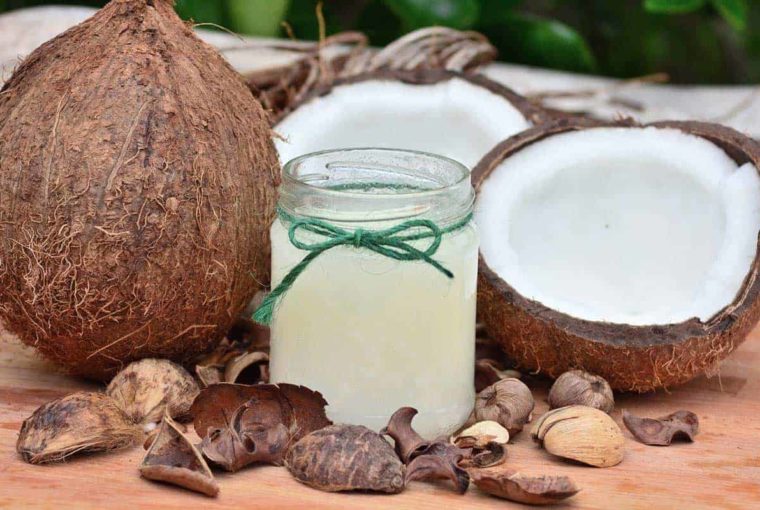Finding the top Evidence-based benefits of Coconut oil is a little difficult because the evidence is not 100% conclusive. In our search for truths that affect your health, this research will give you some of the best evidence and proper uses of coconut oil, but cannot be 100% conclusive. We will give you enough information to make informed health decisions on the use of coconut oil.
What Is Coconut Oil And How Is It Produced?
All coconut oil starts out coming from the same source, which is the white part of a cut-open coconut. This is called the meat or the kernel. There are two processes called refined and unrefined coconut oil.
Refined coconut oil is this meat is removed from the coconut shell, it is heated to dry it out and this results in what is known as “copra”. An expeller press then squeezes out the oil while creating some additional heat to the “copra”. This is refined coconut oil.
In unrefined coconut oil, the extractor simply extracts it from the fresh coconut meat without the additional step of producing “copra”. So it is called “cold-pressed” or virgin coconut oil. The refined coconut oil has a higher smoking point while the unrefined has a stronger coconut flavor. [i]
Benefits Of Coconut Oil
So basically other than the taste and smoking point difference, either refined or unrefined coconut oil will have the same nutritional benefits. Both of them will have the same amount of medium-chain triglycerides (MCT) and 50% lauric acid. It is a matter of personal choice as to which one is better. Everything else is a marketing strategy.[ii]
MCT Benefits
MCT’s are fats that benefit the body rather than hurt the body as they may improve good HDL cholesterol levels. Although the science is not conclusive and may still raise the total bad LDL cholesterol levels if taken in excess.
Medium-chain fatty acids are efficiently broken down by the human body to energy. Although this is true, coconut oil can be almost your entire recommended fat intake daily if used in excess. This means that it has to be considered as part of a healthy diet and not the end-all cure-all.
Heat Stability
Coconut Oil is an oil that does not oxidize under heat until it reaches a temperature of 350 degrees (Unrefined) or 400 degrees (refined). This means that harmful free radicals are less likely to be produced compared to the use of other oils when cooking.
Internal Consumptions Components
So the benefit of coconut oil has to be scientifically backed up by the actual components in the product. A tablespoon of coconut oil contains the following: [iii]
- 120 calories.
- 0 grams of protein
- 14 grams of fat (12 = saturated fat; 1 = monounsaturated fat; and 0.5 grams of polyunsaturated fats.)
- 0 milligrams (mg) of cholesterol
These were taken exactly from the article referenced. It was noted in the same article that different coconut oils offer different benefits based on refined or unrefined and the production process additives can vary. With that being stated, we will look like a few internal consumption benefits.
Coconut Oil benefits when consumed
Here are some of the potential benefits of consuming coconut oil in moderation. Please note that the science in this area is inconclusive and differs among professionals in the health and nutrition fields so it is incumbent upon the reader to do additional research. Here are some internal health benefits.
- It is beneficial in dealing with blood sugar and diabetes.
- It helps fight the onset of Alzheimer ’s disease due to the Medium Chain Fatty Acid (MCFA) component in coconut oil. It helps the liver produce ketones.
- Helps in increasing to some degree the levels of good cholesterol needed in the human body
- It helps in Heart disease and high blood pressure due to the high content of saturated fats that helps boost HDL known as good fats.
- It helps in converting what is known as bad cholesterol into good cholesterol once consumed.
- It helps protect the liver and may help in urinary tract infections.
- Because of the MCFA element in coconut oil, it helps with increased energy that is directly resulted from the benefits to the liver.
- It also helps in digestion as it assists the absorption of vitamins and magnesium and aid in the elimination of toxic bacteria and yeast viruses known as candida.
- It helps with the aging process mainly because it helps the liver do its work.
- It can be used as a weight-loss supplement because coconut oil works to burn calories and fat and boost thyroid performance.
We have just stated in simple terms the 10 benefits of coconut oil when taken properly and moderately. These benefits were mostly from reference iii below but can be found in research online.
Coconut Oil Benefits when Applied Externally
Here are some of the uses and reasons to use coconut oil externally on your skin and hair. Please note again that these are all inconclusive but still have scientific merit.[iv]
- It helps to combat frizzy hair. The reason for this is because the molecules in coconut oil are small enough to penetrate the hair membranes and get to the roots. This in contrast with many conditioners that sit on the outside of the hair and do not get deep into the hair itself.
- Coconut Oil can be used as a skin moisturizer and maybe replace other types of moisturizers. It is not to be used in place of a high-quality sunscreen but as a moisturizer is safe to even use on the face.
- Coconut is anti-bacterial so it can be used to help aid in the healing of cuts and scrapes on the skin.
- Coconut oil can remove face and eye makeup but is no more effective in doing this as other cosmetic removal products.
- Since Coconut Oil smells great, it can be used as a body deodorant but not much help as an antiperspirant. (why would anyone want to use an antiperspirant that is designed to clog the natural human bodies sweat glands?)
- Although the jury is still out on this, Coconut oil can be used to help in oral health as a mouthwash. It has antibacterial tendencies and well, just try it.
The benefits mentioned here are more than 10 but we wanted to give you the basic attributes, benefits, and uses of coconut oil on the positive side. The main negative issues with coconut oil seem to be using it in excess internally and myths surrounding its use externally. It is not our intention in this article to detail out the negative and myths surrounding coconut oil.
The caution in coconut oil is that for the most part, the daily consumption is no more than two tablespoons and starting with one tablespoon. More than two tablespoons per day can start to have diminishing returns and maybe work against any health benefits. Part of the reason for this caution is that most studies on coconut oil have not been conducted extensively on the human population. So the cautions should be taken seriously and the myths as non-scientific.
How does a Person Incorporate Coconut into their Daily Routine?
We will give you some examples of how to use coconut oil internally in your daily life to enjoy its benefits. Here is a good starter list.[v]
- When pan-frying or stir-fry use coconut oil instead of other oils (maybe virgin olive oil is an exception). One could alternate between their frying with coconut oil and virgin olive oil.
- When baking meat, poultry, or fish products, you can drizzle it over the dish as it is cooking in the oven.
- It can be used as an egg substitute in recipes. (replace one egg with coconut oil.(Why would you do this if eggs are good for you)
- It can be used in place of butter in recipes. This makes better sense than an egg substitute.
- Adding a small amount, no more than a teaspoon to your coffee or tea. Might even improve the flavor.
- Use it in conjunction with your daily vitamin and mineral intake as a supplement as it will help your vitamins and some mineral supplements like Magnesium absorb into your digestion process.
Here are a few good ways to use coconut oil externally. You can find products that incorporate it as an ingredient or use it directly. The first thing you can do is to shop for companies that produce refined and unrefined coconut oil and look for the best ones.
Once you find these companies, start researching what they say would be a good use of their product externally on your skin and hair and even as a mouthwash. Is it just marketing by these companies or is there some veracity of their claims. The best studies in the world are those that you experience yourself.
Since in general, coconut oil is a safe substance, then using the product for your experimentation and personal research is not a bad idea.
Secondly start looking for external products that incorporate coconut oil as one of their ingredients, even as the main ingredient. This could include companies that produce shampoo, body lotion, body treatments, deodorants, toothpaste,and well the list goes on. Just look for the ones you currently use and try replacing or upgrading them with products that use coconut oil.
You might be surprised to see how many products use coconut oil. This will be just a start in your journey of researching the benefits of coconut oil in your life.
What about the Naysayers?
As I was doing my research on this article, I did come across some articles that wanted to debunk or dispute the claims not only in this article but the articles I referenced and even the science behind it. It is our opinion that some of the naysayer claims may have some legitimacy mainly due to marketing hype, social trends that come and go, and even the lack of rigorous scientific research.
One such example and one that I omitted purposely as a benefit is that coconut oil can be used as a sunscreen. I omitted this because it would be devastating if someone used coconut oil as a sun blocker and ended up with a seriously bad sunburn, that could even be life-threatening. The traditional sun blockers in the market (SP-15 or higher) will serve you well without you rubbing yourself down with coconut oil just to smell good on the beach.
As with anything out in the public domain, there will be pros and cons of any product, subject, or topic. That is not a bad thing and one that you should embrace as a serious student of your health.
Summary Position
So let’s take a look at this logically. The coconut itself is a naturally grown plant that has been incorporated as an agricultural fruit, seed, or nut, as one may want to describe it. The reason it is grown agriculturally is thatenough people in the world use it as a food or topical oil that is good for you overall. It is one of nature’s bountiful blessings similar to other fruits and vegetables that are grown in large quantities to meet the human consumption demand worldwide.
So the most logical conclusion would be that the coconut has benefits to human beings because it is a product of nature initially. So why would anyone want to dismiss it as not good for one’s health? Who knows? Our position is that one should use it for its intended purposes and uses that are helpful and disregard the not yet proven uses.
All things considered, the benefits and uses of coconut oil as presented in this article should be shown to be helpful to you and your life’s journey. Please be a thoughtful reader and start your research if you plan on using coconut oil in your daily routine.
As always, we give you this information so you can live the best life possible. To your health!
References:
[i]https://www.chowhound.com/food-news/214730/how-coconut-oil-is-made/
[ii]https://www.nutiva.com/kitchen/virgin-vs-refined-coconut-oil-5-things-you-need-to-know/
[iii]https://www.thestreet.com/lifestyle/health/benefits-of-coconut-oil-14776575
[iv]https://www.today.com/food/10-ways-use-coconut-oil-separating-myths-miracles-t9451
[v]https://www.thestreet.com/lifestyle/health/benefits-of-coconut-oil-14776575




